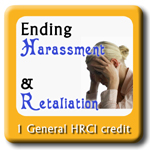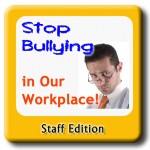Sexual harassment in the workplace is against the law. It is also unlawful to harass and discriminate against people because of their age, religion, national origin, disability or race. In fact, there are several protected classes of people against whom it is illegal to harass in the workplace. See list at: http://www.eeoc.gov/laws/types/
In fact, there are several protected classes of people against whom it is illegal to harass in the workplace. See list at: http://www.eeoc.gov/laws/types/
In addition to it being illegal to harass people, it’s also illegal to discriminate against them and it’s illegal to retaliate against them if they complain about harassment or discrimination.
And that’s just federal law. Most states have similar laws that prohibit discrimination and harassment and retaliation against people in the workplace in similar protected classes.
Several states require that employers provide sexual harassment training to their supervisors and employees (California, Maine & Connecticut as well as other states that require this training for state employees). But even for those states that don’t require sexual harassment training, the Equal Employment Opportunity Commission recommends that all employers provide this training, pretty much every 2 years.
Further, the U.S. Supreme Court has stated pretty clearly that for a company to reduce liability for harassment claims it must train employees and supervisors, require employees to report incidents of harassment, thoroughly investigate all reports and take corrective action when necessary. See: Montero v. AGCO Corp., 19 F. Supp. 2d 1148 (E.D. Cal. 1998) “ where the court held that the employer’s sexual harassment policy and response to plaintiff’s claim met the criteria for an affirmative defense under Faragher and dismissed plaintiff’s sexual harassment claim.” http://www.omwlaw.com/wp-content/uploads/2013/01/Supreme-Court-Clarifies-Employers-Liability-for-Sexual-Harassment.pdf
What does all this mean if you are an employee being harassed?
1st, it means the labor laws only protect you if you are in a protected class. But even if you aren’t, you still should have protection and have a reasonable expectation that you won’t be emotionally bullied in the workplace. However, getting your employer to protect you isn’t necessarily easy. You will only get that protection if you work with your employer to get the harassment to stop.
You have no choice but to use your employers reporting system. If your employer has a policy in place and if you don’t use it, you will have trouble if you decide to escalate your problem to the courts.
To make sure that your employer helps you and to ensure you can file a lawsuit if they don’t, you have to document everything. You need to learn how to document what is happening, how to report what is happening, how to follow up with your reports professionally, and most importantly, how to respond to the harassment in real time to get it to stop. Ideally, this information should be part of their regularly scheduled sexual harassment training.  Too often it is not.
Too often it is not.
If your company’s harassment training was inadequate and you need to learn how to document your situation properly and protect yourself while helping your company get rid of the bully –take my course – Ending Harassment & Retaliation in the Workplace – https://humanistlearning.com/retaliation1/
What all this means if you are an employer?
You need to provide sexual harassment training to your employees. All our employees. They need to know what your policy is, and they need to know the process by which complaints can be made and investigated and what to expect when they lodge a complaint.
Your training should ideally not just tell them that harassment is illegal – period. You also need to teach them how to report it and how they can and must work with the company to stop it. Finally, and this is really important, you have to take steps to ensure that you actively monitor for retaliation to protect employees who do file complaints. If you do this, you should be OK if any legal complaints are filed against you.
Because retaliation is the main concern people have that prevents them from reporting in the first place or following up once they have made a report, it’s important that your training address the retaliation dynamic head on. And no – it’s not enough to tell them retaliation is illegal. To help them understand and stop it you need to teach them the behavioral techniques required to control it, so even if it does happen your employees know what do about it. And just so you know, retaliation will happen because it is predicted to happen under the behavioral model. Failure to plan for the retaliation dynamic and assist your employees through the retaliation dynamic represents a failure of your reporting processes and handling process.
I speak to a lot of HR professionals about this and they tell me, they like the sexual harassment training they provide, but … their employees don’t. The problem is that while the training provides basic CYA legal coverage for the employer, it doesn’t actually provide the employees with actionable intelligence on how to get the harassing behavior directed against them to stop. And that’s what employees really want to know.
The best protection an employer can have is a workplace that is truly respectful of all employees. Employers must learn how to not only create sexual harassment trainings that will provide the intelligence their employees really want, but also how to ensure that their own processes support their employees so that they want to report what is happening so that they employer can deal with it professionally.
 To learn more about how to create sexual harassment trainings that work and how to stop bullying and harassment in the workplace as well – check out my bullying and harassment training programs at: https://humanistlearning.com/category/bullyingharassment/
To learn more about how to create sexual harassment trainings that work and how to stop bullying and harassment in the workplace as well – check out my bullying and harassment training programs at: https://humanistlearning.com/category/bullyingharassment/
And if you are in the market for sexual harassment training and would like a training that will actually help – consider my sexual harassment training for supervisors and staff – https://humanistlearning.com/category/businesscourses/staff-development/

